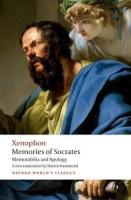
OUP (2023) p/b 243pp £9.99 (ISBN 9780198856092)
Scholars have been working away for some years at a quiet reappraisal of Xenophon as a serious author in his own right. This translation helps to bring him to the notice of a wider audience, in particular students following courses investigating the political, social, and cultural life of fifth- and fourth-century Athens. No longer dismissed for not presenting Socrates as a revolutionary philosopher or disparaged as a retired military buffer living the good life in exile from democratic Athens on his Sparta-donated country estate, Xenophon in these two books appears before us as a man deeply interested in the kind of moral and especially practical education essential to a life as a good citizen and leader in a democracy. Foremost in this education is the importance of self-knowledge. This is a good time to be thinking of such things. It could be that more people today are interested in moral and political thinking than in epistemology and metaphysics, especially in a world where, as A. slyly observes in her introduction, leaders are being publicly examined for their attitude to truth-telling and grasp of detail.
The Memorabilia, helpfully here translated as Memoirs of Socrates, features a series of conversations between Socrates and privileged young Athenian men—as does the recent Oxford World’s Classic versions of Xenophon’s Oeconomicus and Symposium. A.’s clear and lively introduction first covers Xenophon’s background in its political and intellectual context and his relations with Athens, including how far he was aware of and reacted to Plato’s portrayal of Socrates. Scholarly matters like composition dates and the possible influence of one writer on the other are briefly dealt with. Next comes the issues raised by Socrates’ trial, philosophy in fourth-century Athens, and the structure and themes of the Memorabilia, highlighting life as a family member and citizen, and (Xenophon’s preoccupation) the importance of education. There follows a discussion of key concepts in Xenophon’s thought: the ‘man of quality’ (see below), the question of freedom (a contrast here with Aristotle), and the craft analogy (technê). Finally ‘Responses to Xenophon’ is both an engaging canter through his intellectual afterlife (admired by Machiavelli and Elizabethan ‘Mirror for Princes’ textbooks for his down-to-earth sagacity, dismissed by Schleiermacher and Burnet for not being Plato), and an understated vote for the current movement to restore him to his proper place in the canon of Greek intellectual heavyweights—all surveyed without any reference to ‘Reception’.
Putting Xenophon’s ‘stylish prose’ (A.) into attractive and readable English is not as simple as it looks. Hitting the right register for dialogue is not too difficult; it is in passages of continuous prose that the translator runs the risk of lurching into a kind of schoolboy near-English. H. is a deft and experienced translator, equally at home with meaty Thucydides (a magisterial version) and plain straightforward Xenophon. Here is Mem.2.9.4:
So after this conversation (ek touton) they lighted on (aneuriskousin) one Archedemus, who was an extremely capable advocate and fixer, but poor—he was not one to make money indiscriminately, but a passionate champion of honesty (philochrestos), and he said that it was very easy to sting (lambanein apo) these false accusers.
And here is the recent (2013) revision of Marchant’s Loeb by Jeffrey Henderson:
At that they sought out Archedemus, an excellent speaker and man of affairs, but poor. For (gar) he was not one of those who make money unscrupulously but an honest man, and he would say that it was easy to take forfeit from false accusers.
Eyebrows might be raised at H.’s ‘fixer’ (the Greek means ‘good at getting things done’) and his expansion of philochrestos, but he avoids the redundant gar, which of course simply explains the previous sentence, and drills down to the primary meaning of aneuriskousin. Xenophon is a careful user of compound verbs, something H. notices throughout, e.g. at 4.4.15 where Socrates praises Lycurgus for ‘entrenching’obedience to Spartan laws (eneirgasato); the Loeb has ‘established’. But the main point is that H.’s version has an up-to-date swing about it that carries the reader along.
There are certain key words in Greek literature which cause problems to a translator trying to find an English equivalent that comes anywhere near echoing their Greek cultural resonance. All one can do is settle for the closest match—one has to write something—and support it with as much information as possible to explain the mind set behind the Greek word. For Xenophon, the ideal family man and citizen, the type that education should strive to produce, is the kaloskagathos, a portmanteau word combining the adjectives ‘beautiful/handsome’ and ‘good’. Two of the translator’s difficulties are that Greeks in antiquity admired physical beauty in men, and that ‘good’, as A. points out, primarily implies a set of skills rather than a range of ethical qualities. H. and A. reject the traditional ‘gentleman’ rendering, going for ‘man of quality’ instead. It is true that the former has an out-of-date Edwardian ring about it, but debatable if their solution is any better; and the phrase does lead H. in one place to describing the best kind of man’s ideal existence as a ‘life of quality’, which doesn’t really mean very much. As to aretê, the summation of attributes that the kaloskagathos is reckoned to possess and a notorious translation stumbling block, H. settles on the old favourite ‘virtue’, with a supporting explanation of its fourth-century social and cultural resonance. This is what both what the serious student and the general reader want.
None of this detracts from the excellence of this book, both for its assessment of Xenophon’s significance and for the light it throws on a crucial period of Greek intellectual and political history.
Anthony Verity
His translation of Xenophon: Estate Management and Symposium (with notes and introduction by Emily Baragwanath), was published by OUP last year.
